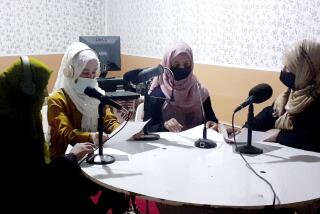British Forces Radio Comes to Forefront : Broadcasting: War gives renewed importance to radio service for troops. Politicians and celebrities are scrambling to get their views on the air.
- Share via
LONDON — Only six months ago, the British Forces Broadcasting Service, which transmits radio and TV programs to British troops and their families abroad, was at a distinctly low ebb. Several of its 70 on-air staff had their resumes out and were combing ads for job vacancies.
The Cold War’s end had made the service, which began in World War II, seem irrelevant. “Obviously, the peace dividend brings cuts in forces stationed overseas,” said British Forces Broadcasting Service spokesman Roger Edward-Jones.
Then Saddam Hussein invaded Kuwait, 30,000 British troops were dispatched to the Gulf--and the radio service suddenly became the place to be. Politicians and celebrities have scrambled to be interviewed on it.
“I don’t think our profile has ever been higher,” said Richard Nankivell, the service’s senior program director in Germany. “Since we’ve been broadcasting from the Gulf, everyone wants to get in on the act.”
This excitement culminated Friday in a rare coup--Prime Minister John Major came to its small west London studios for a unique three-way radio linkup. Nankivell talked to him from Germany and Major took questions from British soldiers in Saudi Arabia and gave a morale-boosting address to all troops. “It was a very successful exercise,” Nankivell said.
Britain’s two other major political party leaders, Labor’s Neil Kinnock and the Liberal Democrats’ Paddy Ashdown, had already been on the service to answer questions and address troops.
Celebrities have been muscling in too. Pop singer Cliff Richard and England soccer captain Gary Lineker have been among those recently featured. “A few months ago, we would never have got people like this,” Edward-Jones said. “Now, they’re asking us if they can come along.”
British Forces Broadcasting Service set up its new station in the small Saudi town of Al Jubayl in mid-December. It is staffed by three on-air presenters, who work eight-hour shifts round the clock, alternating live broadcasts of three or four hours with pre-recorded BBC radio broadcasts within each shift.
“This is an unusual situation for us,” said presenter Jon Bennett, speaking by phone from Al Jubayl. “Normally, we don’t get to start up a station while a war is going on. We usually wait until peacekeeping garrisons are established.
“We would have set up earlier, but we had to get funding from the Ministry of Defense first.”
Lt.-Gen. Sir Peter de la Billiere, commander of the British forces in the Middle East, came to the aid of the British Forces Broadcasting Service. “He knew of our work from when we were in the Falklands for that war,” said Bennett. “He appreciated what we did then in keeping troops informed and entertained, and he pushed for us to be in the Gulf.”
From Al Jubayl, the service broadcasts news bulletins every half-hour, as well as phone-ins and request shows. Most of the requests come from families and relatives in Britain and Germany. “We had 500 yesterday alone,” said Bennett.
The Al Jubayl station already has a nickname: Desert Radio. “It’s like the U.S. forces, who have Oasis Radio,” said Edward-Jones, adding dryly: “The difference in the names probably indicates the difference in funding levels.”
The service, a civilian corporation, maintains radio stations in far-flung outposts like Gibraltar, Cyprus and Brunei. It also records three hours of British television programming each day, makes 120 copies on videocassette and flies them out to troops in the Gulf. In addition, BFBS runs retail outlets that sell and rent TVs and VCRs to troops.
More to Read
Sign up for Essential California
The most important California stories and recommendations in your inbox every morning.
You may occasionally receive promotional content from the Los Angeles Times.













